Bourke Ulick J. Aryan Origin of the Gaelic Race and Language
Подождите немного. Документ загружается.

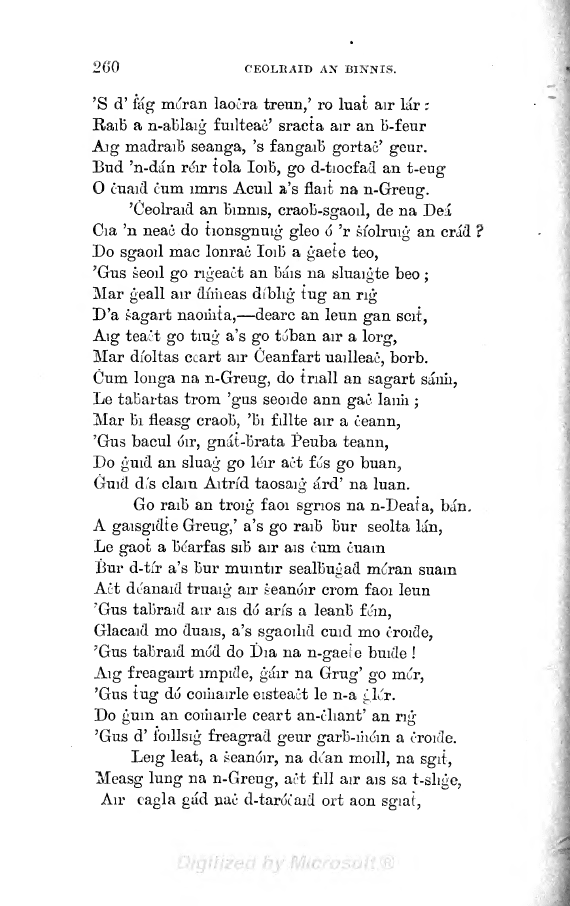
260
CEOLEAID
AN
BINNIS.
'S
d'
fag
muran laocra
treun,'
ro
luat
air
lar :
RaiB
a
n-aBlaig
fuilteac'
sracta air an
B-feur
Aig
madraib
seanga,
's
fangaiB
gortac' geur.
Bud
'n-dan r&r
tola
loiB,
go
d-tiocfad
an
t-eug
cuaid
cum
imris Acml
a's flait
na
n-Greug.
'Ceolraid
an
Bmnis,
craoB-sgaoil,
de na
Dea
Cia
'n
neac do
tionsgnmg
gleo
6
'r
siolrmg
an crad
?
Do
sgaoil
mac lonrac loiB a
gaete
teo,
'Gus
seoil
go
rigeact
an
Mis
na
sluaigte
beo
;
Mar
geall
air
dimeas
diblig
tug
an
rig
D'a
sagart
naomta,
dearc an
leun
gan
scit,
Aig
teai't
go
tmg
a's
go
tuban
air
a
lorg,
Mar dioltas ceart
air
Ceanfart
uailleae,
borb.
Cum
longa
na
n-Greug,
do
triall
an
sagart
sauii,
Le
tabartas
trom
'gus
seoide
ann
gac
lairii
j
Mar
Bi
fleasg
craoB,
'Bi
fillte
air a
ceann,
'Gus bacul
oir,
gnat-Brata
Peuba
teann,
Do
guid
an
sluag
go
leir act
fos
go
buan,
Guid
dfs clam
Aitr/d
taosaig
ard' na
luan.
Go
raiB an
troig
faoi
sgrios
na
n-Deata,
ban.
A
gaisgidte Greug,'
a's
go
raiB
Bur
seolta
Ian,
Le
gaot
a
Bdarfas
siB
air
ais cum
cuain
Eur d-tir a's Bur
mumtir
sealBugad
m^ran
suam
Act
dcanaid
truaig
air
seanoir
crom faoi
leun
'Gus
taBraid air
ais
do
ar/s a leanB
fern,
Glacaid
mo
duais,
a's
sgaoilid
cuid
mo
croide,
?
Gus
taBraid mud
do
Dia
na
n-gaete
bmde !
Aig
freagairt impifle,
gair
na
Grug' go
mor,
'Gus
tug
do
comairle eisteact
le
n-a
glor.
Do
gum
an coriiairle
ceart
an-cliant'
an
rig
'Gus
d'
foillsig
freagrad
geur garB-ihem
a
croide.
Leig
leat,
a
seanuir,
na dean
moill,
na
sgit,
Measg
lung
na
n-Greug,
act fill air
ais
sa
t-slige,
Air
eagla
gad
nac
d-tarutaid ort aon
sgiat,
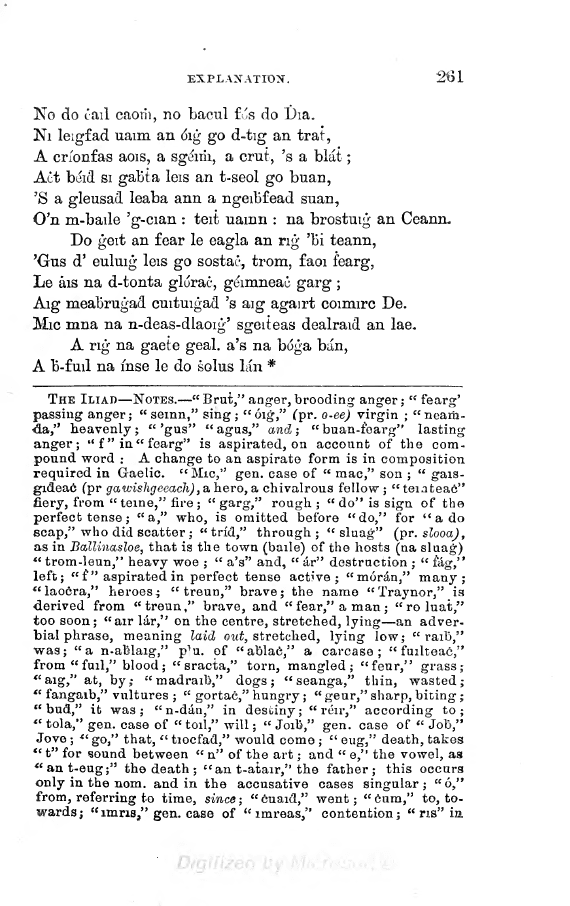
EXPLANATION.
261
No do iail
caorii,
no
bacul 's
do Dia.
Ni
leigfad
uaim
an
6ig
go d-tig
an
trat,
A
crionfas
aois,
a
sg^irii,
a
crut,
's a
blat
;
Act beid si
gaBta
leis an t-seol
go
buan,
'S
a
gleusad
leaba ann
a
ngeiBfead
suan,
O'n m-baile
'g-cian
: teit
uamn : na
brostuig
an
Ceann.
Do
geit
an
fear le
eagla
an
rig
'Bi
teann,
'Gus
d'
euluig
leis
go
sostae, trom,
faoi
fearg,
Le ais
na d-tonta
glurac, g&mneac
garg
;
Aig
ineaBriigad
cmtuigad
's
aig
agairt
coimirc
De.
Mic
nma na
n-deas-dlaoig'
sgeiteas
dealraid
an
lae.
A
rig
na
gaete geal.
a's na
b(5ga
ban,
A
B-f
uil
na mse le
do
solus Ian
*
THE ILIAD NOTES.
"Brut,"
anger, brooding anger;
"
fearg'
passing
anger;
"
seinn,"
sing;
"
oig,"
(pr.
o-ee)
virgin
;
"
neam-
ila,"
heavenly
;
"
'gus"
"
agus,"
and
;
"
buan-fiearg"
lasting
anger;
"fin
"fearg"
is
aspirated,
on
account
of the
com-
pound
word
:
A
change
to an
aspirate
form is
in
composition
required
in Gaelic.
"Mic,"
gen.
case
of
"
mac,"
son
;
"
gais-
gideac
(pr
gawisligeeach),a,}iero,
a
chivalrous
fellow;
"teiateac"
fiery,
from
"
teine,"
fire
;
"
garg," rough
;
"
do"
is
sign
of
the
perfect
tense;
"a," who,
is
omitted before
"do,"
for
"ado
scap,"
who
did
scatter
;
"trid,"
through;
"
sluag"
(pr. slooa},
as in
Ballinasloe,
that
is the town
(baile)
of
the
hosts
(na
sluag)
"
trom-leun,"
heavy
woe
;
"
a's"
and,
"
ar"
destruction
;
"
fag,"
left;
"
f"
aspirated
in
perfect
tense
active;
"moran,"
many;
<c
laocra,"
heroes;
"
treun," brave;
the name
"
Tray
nor,"
is
derived
from
"
treun
,"
brave,
and
"
fear,"
a
man
;
"
ro
luat,"
too
soon;
"air
lar,"
on the
centre,
stretched,
lying
an
adver-
bial
phrase,
meaning
laid
o, stretched,
lying
low;
"
rails,"
was;
"a
n-aBlaig,"
p^a.
of
"
ablae,"
a
carcase;
"
fuilteac,"
from
"
fuil,"
blood;
"
sracta," torn,
mangled;
"
feur,"
grass;
"aig," at,
by;
"madraib,"
dogs;
<c
seanga,"
thin,
wasted;
"
fangaib,"
vultures
;
"
gortac,"
hungi-y
;
"
geur,"
sharp, biting
;
"bud,"
it
was;
"
n-dan,"
in
destiny;
"
reir," according
to;
ee
tola,"
gen.
case
of
"
toil,"
will
;
"
Joib
,"
gen.
case
of
*'
Job,"
Jove
;
*'
go," that,
"
tiocfad,"
would
come
;
"
eug,"
death,
takes
"
t"
for
sound
between
"
n" of the art
;
and
"
e,"
the
vowel,
as
"ant-eug;"
the
death
;
"an
t-atair,"
the
father;
this occurs
only
in
the
nom.
and
in
the accusative
cases
singular
;
"
6,"
from,
referring
to
time,
since; "cuaid," went;
"cum,"
to,
to-
wards;
"imris,"
gen.
case
of
"
imreas,"
contention;
"
ris"
ia
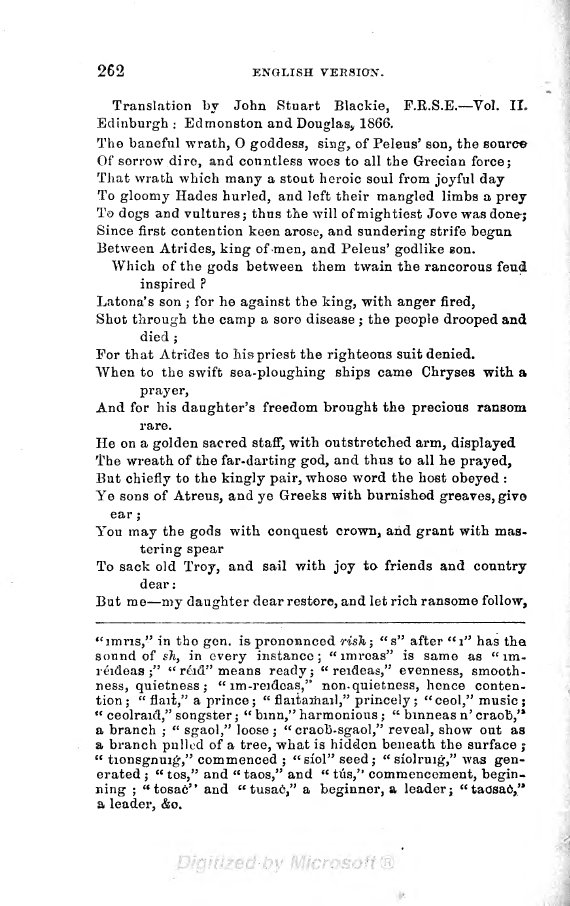
262
ENGLISH VERSION.
Translation
by
John
Stuart
Blackie,
F.E.S.E. Vol.
IL
Edinburgh
:
Edmonston and
Douglas.
1866.
The baneful
wrath,
O
goddess,
sing,
of Peleus'
son,
the source
Of
sorrow
dire,
and countless
woes to all the Grecian
force;
That
wrath which
many
a stout
heroic soul
from
joyful day
To
gloomy
Hades
hurled,
and
left
their
mangled
limbs a
prey
To
dogs
and
vultures,-
thus
the
will of
mightiest
Jove was
done;
Since
first contention
keen
arose,
and
sundering
strife
begun
Between
Atrides,
king
of
-men,
and Peleus'
godlike
son.
Which
of
the
gods
between them twain the
rancorous
feud
inspired
?
Latona's
son
;
for
he
against
the
king,
with
anger fired,
Shot
through
the
camp
a sore disease
;
the
people drooped
and
died;
For that Atrides
to
his
priest
the
righteous
suit
denied.
When to the
swift
sea-ploughing
ships
came
Chryses
with a
prayer,
And
for
his
daughter's
freedom
brought
the
precious
ransom
rare.
He on
a
golden
sacred
staff,
with outstretched
arm,
displayed
The wreath
of
the
far-darting god,
and thus
to all
he
prayed,
But
chiefly
to the
kingly pair,
whose
word the
host
obeyed
:
Ye sons of
Atreus,
and
ye
Greeks
with burnished
greaves,
givo
ear
;
You
may
the
gods
with
conquest
crown,
and
grant
with
mas-
tering spear
To sack old
Troy,
and sail
with
joy
ta friends and
country
dear :
But me
my daughter
dear
restore,
and let
rich
ransome
follow,
"imns,"
in the
gen.
is
prononnced
risk
;
"s"
after "i"
has the
sound
of
s~h,
in
every
instance;
"
imreas" is
same
as
"
im-
reideas
;"
"
read" means
ready;
"
reideas,"
evenness:,
smooth-
ness,
quietness;
"
im
-reideas,"
non-
quietness,
hence
conten-
tion;
"
flait,"
a
prince;
"
flaitamail,"
princely;
"ceol,"
music;
"
ceolraid,"
songster
;
"
binn,"
harmonious
;
"
binneas
n'
craob",'*
a branch
;
"
sgaol,"
loose;
"
craob-sgaol,"
reveal,
show
out
as
a
branch
pulled
of
a
tree,
what
is hidden beneath
the surface
j
"
tionsgnuig,"
commenced
;
"siol"
seed;
"
siolruig,"
-was
gen-
erated
;
"
tos,"
and
"
taos,"
and
"
tiis,"
commencement,
begin-
ning
;
'*
tosac"
and
"
tusac,"
a
beginner,
a
leader;
"taosac,"
a
leader,
&o.
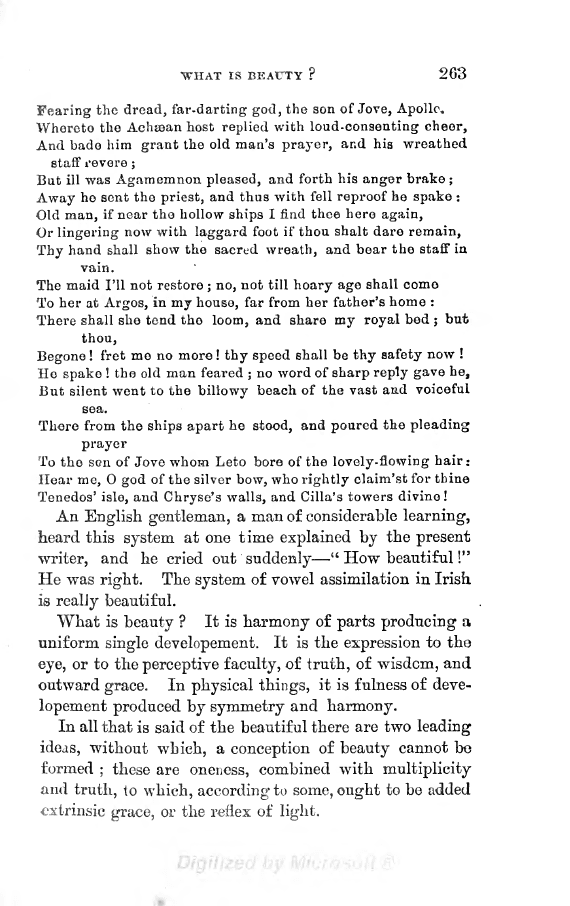
WHAT
IS BEATJTY
?
263
Fearing
the
dread, far-darting god,
the son
of
Jove, Apollo,
Whereto
the
Achaean
host
replied
with
loud-consenting
cheer,
And
bade
him
grant
the
old man's
prayer,
and
his
wreathed
staff
revere
;
But
ill was
Agamemnon
pleased,
and
forth
his
anger
brake;
Away
he
sent the
priest,
and thus with fell
reproof
he
spake
:
Old
man,
if near the hollow
ships
I find thee here
again,
Or
lingering
now
with
laggard
foot if thou
shalt dare
remain,
Thy
hand shall
show
the
sacred
wreath,
and
bear
the staff
in
vain.
The
maid
I'll
not restore
; no,
not
till
hoary
age
shall come
To
her
at
Argos,
in
my
house,
far
from
her father's
home :
There
shall she
tend
the
loom,
and share
my
royal
bed
;
but
thou,
Begone
!
fret
me no more !
thy
speed
shall be
thy
safety
now !
He
spake
!
the
old
man feared
;
no
word
of
sharp
reply
gave
he,
But silent
went
to the
billowy
beach
of the vast
and
voiceful
sea.
There
from the
ships
apart
he
stood,
and
poured
the
pleading
prayer
To
the son
of
Jove
whom Leto bore
of the
lovely-flowing
hair:
Hear
me,
O
god
of
the
silver
bow,
who
rightly
claim'st
for thine
Tenedos'
isle,
and
Chryse's
walls,
and Cilia's
towers
divine !
An
English gentleman,
a man of
considerable
learning,
heard this
system
at one
time
explained
by
the
present
writer,
and
he cried out
suddenly
"
How beautiful
!"
He was
right.
The
system
of
vowel
assimilation
in Irish,
is
really
beautiful.
What
is
beauty
?
It is
harmony
of
parts
producing
a
uniform
single
developement.
It
is the
expression
to the
eye,
or to
the
perceptive
faculty,
of
truth,
of
wisdom,
and
outward
grace.
In
physical things,
it
is
fulness
of deve-
lopement
produced
by symmetry
and
harmony.
In all
that
is
said
of
the beautiful
there
are two
leading
ideas,
without
which,
a
conception
of
beauty
cannot
be
formed
;
these
are
oneness,
combined
with
multiplicity
and
truth,
to
which,
according
to
some,
ought
to be
added
extrinsic
grace,
or
the reflex
of
light.
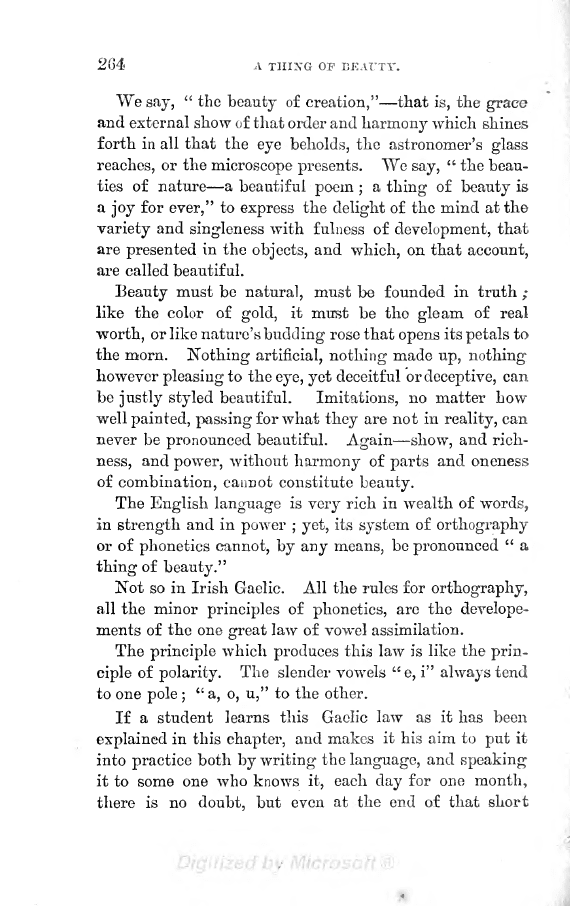
264
A
THING
OP BEAUTY.
We
say,
"
the
beauty
of
creation,"
that
is,
the
grace
and
external show
of that order and
harmony
which
shines
forth in all that
the
eye
beholds,
the
astronomer's
glass
reaches,
or
the
microscope
presents.
We
say,
u
the
beau-
ties of nature a
beautiful
poem
;
a
thing
of
beauty
is
a
joy
for
ever,"
to
express
the
delight
of the mind at
the
variety
and
singleness
with
fulness
of
development,
that
are
presented
in
the
objects,
and
which,
on
that
account,
are
called
beautiful.
Beauty
must
be
natural,
must be founded
in truth
;
like the color of
gold,
it
must be the
gleam
of real
worth,
or like
nature's
budding
rose that
opens
its
petals
to
the morn.
Nothing
artificial,
nothing
made
up, nothing
however
pleasing
to the
eye,
yet
deceitful or
deceptive,
can
be
justly
styled
beautiful.
Imitations,
no matter how-
well
painted,
passing
for what
they
are not
in
reality,
can
never
be
pronounced
beautiful.
Again
show,
and rich-
ness,
and
power,
without
harmony
of
parts
and
oneness
of
combination,
cannot
constitute
beauty.
The
English
language
is
very
rich
in
wealth
of
words,
in
strength
and
in
power
;
yet,
its
system
of
orthography
or of
phonetics
cannot,
by
any
means,
be
pronounced
"
a
thing
of
beauty."
Not
so
in
Irish
Gaelic.
All the rules
for
orthography,
all
the
minor
principles
of
phonetics,
are the
develope-
ments
of
the one
great
law of
vowel
assimilation.
The
principle
which
produces
this
law
is
like the
prin-
ciple
of
polarity.
The
slender vowels
"e,
i"
always
tend
to
one
pole
;
"
a,
o,
u,"
to
the other.
If
a student learns
this
Gaelic
law as
it
has
been
explained
in this
chapter,
and
makes
it
his aim to
put
it
into
practice
both
by
writing
the
language,
and
speaking
it
to some one who knows
it,
each
day
for one
month,
there
is no
doubt,
but
even
at -the
end of
that short
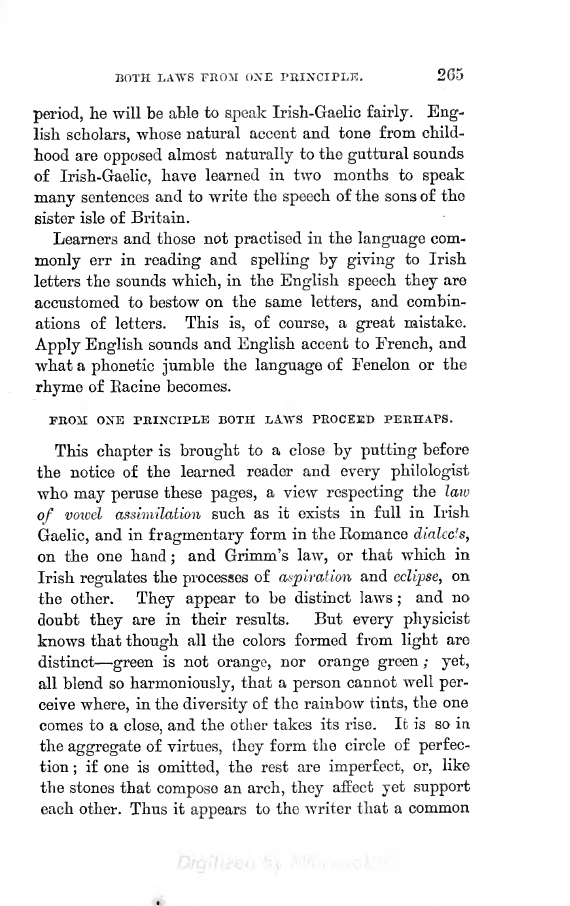
BOTH
LAWS
FROM
ONE PRINCIPLE.
265
period,
he will be
able
to
speak
Irish-Gaelic
fairly. Eng-
lish
scholars,
whose
natural accent and
tone
from child-
hood
are
opposed
almost
naturally
to the
guttural
sounds
of
Irish-Gaelic,
have
learned
in two
months
to
speak
many
sentences
and to
write
the
speech
of the sons
of the
sister
isle of
Britain.
Learners
and those
not
practised
in
the
language
com-
monly
err in
reading
and
spelling
by giving
to
Irish
letters
the sounds
which,
in the
English
speech
they
are
accustomed
to
bestow
on
the same
letters,
and combin-
ations
of letters.
This
is,
of
course,
a
great
mistake.
Apply English
sounds
and
English
accent
to
French,
and
what
a
phonetic
jumble
the
language
of Fenelon
or
the
rhyme
of
Eacine
becomes.
PROM ONE PRINCIPLE
BOTH LAWS
PROCEED
PERHAPS.
This
chapter
is
brought
to
a
close
by
putting
before
the
notice of
the learned
reader
and
every philologist
who
may peruse
these
pages,
a view
respecting
the law
of
vowel
assimilation
such
as
it exists
in full
in Irish
Gaelic,
and
in
fragmentary
form
in the Romance
dialec's,
on the
one
hand
;
and
Grimm's
law,
or that
which
in
Irish
regulates
the
processes
of
aspiration
and
eclipse,
on
the other.
They appear
to be distinct
laws
;
and
no
doubt
they
are
in their results.
But
every physicist
knows
that
though
all the
colors
formed
from
light
are
distinct
green
is not
orange,
nor
orange green
;
yet,
all blend
so
harmoniously,
that
a
person
cannot
well
per-
ceive
where,
in the
diversity
of the rainbow
tints,
the one
comes to a
close,
and the
other takes
its rise.
It
is so
in
the
aggregate
of
virtues,
they
form
the
circle
of
perfec-
tion
;
if
one is
omitted,
the rest
are
imperfect,
or,
like
the
stones that
compose
an
arch,
they
affect
yet
support
each other.
Thus
it
appears
to the
writer
that
a common
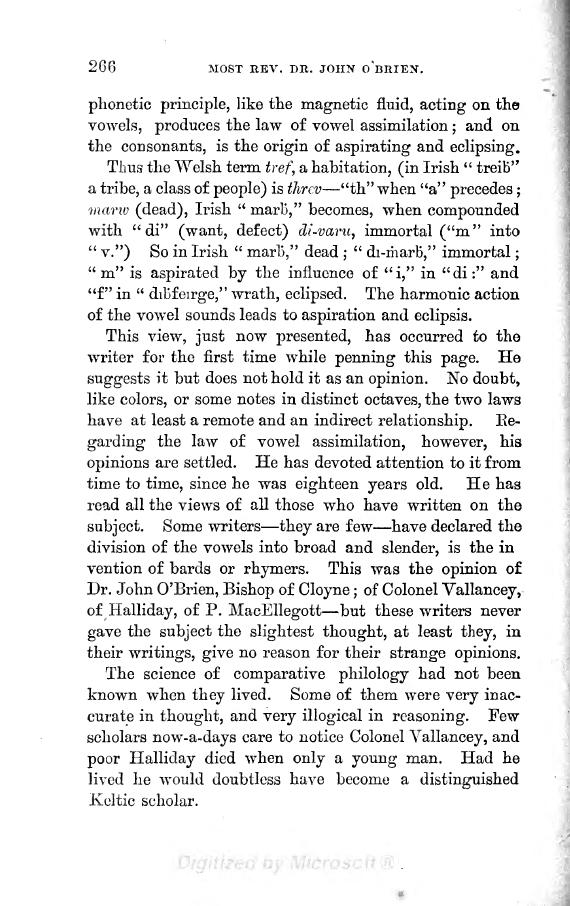
266
MOST
REV.
DR.
JOHN
O'BRIEN.
phonetic principle,
like
the
magnetic
fluid,
acting
on
the
vowels,
produces
the
law of
vowel assimilation
;
and on
the
consonants,
is the
origin
of
aspirating
and
eclipsing.
Thus the
Welsh term
tref,
a
habitation,
(in
Irish
"
treib"
a
tribe,
a class
of
people)
is tlirev
"th" when
"a"
precedes
;
marw
(dead),
Irish
"
marB,"
becomes,
when
compounded
with
"di"
(want, defect)
di-varu,
immortal
("m"
into
"
v.")
So
in
Irish
"
marB,"
dead
;
"
di-marB,"
immortal
;
"
m"
is
aspirated by
the
influence of
"i,"
in
"di:"
and
"f
"
in
"
diBfeirge,"
wrath,
eclipsed.
The harmonic action
of
the vowel
sounds leads
to
aspiration
and
eclipsis.
This
view,
just
now
presented,
has
occurred
to the
writer
for the first time while
penning
this
page.
He
suggests
it
but
does
not
hold
it
as
an
opinion.
No
doubt,
like
colors,
or some notes in distinct
octaves,
the two laws
have
at least
a
remote and an
indirect
relationship.
Re-
garding
the
law
of
vowel
assimilation,
however,
his
opinions
are settled. He has devoted
attention to
it
from
time to
time,
since he was
eighteen years
old. He has
read all
the
views
of
all
those
who
have
written
on
the
subject.
Some writers
they
are
few have
declared
the
division
of the
vowels
into broad
and
slender,
is the
in
vention of
bards
or
rhymers.
This
was
the
opinion
of
Dr.
John
O'Brien,
Bishop
of
Cloyne
;
of Colonel
Vallancey,
of
Halliday,
of P.
MacEllegott
but
these writers
never
gave
the
subject
the
slightest
thought,
at least
they,
in
their
writings, give
no
reason
for their
strange
opinions.
The science
of
comparative
philology
had not
been
known when
they
lived.
Some
of them
were
very
inac-
curate
in
thought,
and
very illogical
in
reasoning.
Few
scholars
now-a-days
care
to notice Colonel
Vallancey,
and
poor
Halliday
died
when
only
a
young
man. Had
he
lived he would doubtless have
become
a
distinguished
Keltic
scholar.
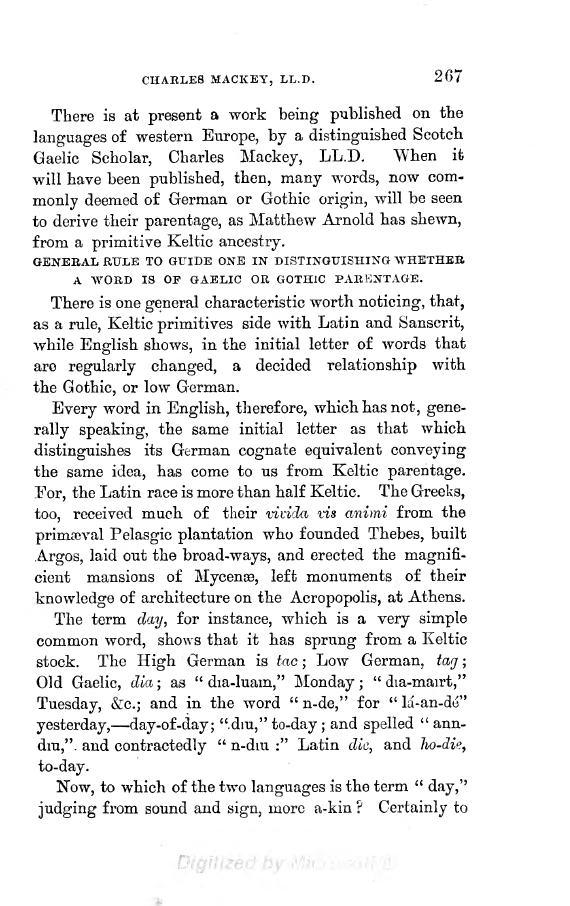
CHARLES
MACKEY,
LL.D.
267
There
is at
present
a
work
being
published
on
the
languages
of western
Europe, by
a
distinguished
Scotch
Gaelic
Scholar,
Charles
Mackey,
LL.D.
When
it
will
have
been
published,
then,
many
words,
now
com-
monly
deemed
of
German
or
Gothic
origin,
will
be
seen
to derive
their
parentage,
as Matthew
Arnold
has
shewn,
from a
primitive
Keltic
ancestry.
GENERAL
RULE
TO
GUIDE ONE
IN DISTINGUISHING
WHETHER
A WORD
IS OF GAELIC
OR GOTHIC
PARENTAGE.
There
is
one
general
characteristic
worth
noticing,
that,
as
a
rule,
Keltic
primitives
side
with Latin
and
Sanscrit,
while
English
shows,
in the
initial
letter of
words
that
are
regularly changed,
a decided
relationship
with
the
Gothic,
or low German.
Every
word
in
English,
therefore,
which
has
not,
gene-
rally
speaking,
the
same
initial
letter
as
that
which
distinguishes
its German
cognate
equivalent
conveying
the same
idea,
has come
to us
from
Keltic
parentage.
For,
the Latin
race is more
than
half Keltic.
The
Greeks,
too,
received
much
of their
viiida
vis
animi
from
the
primaeval
Pelasgic
plantation
who
founded
Thebes,
built
Argos,
laid out
the
broad-ways,
and
erected
the
magnifi-
cient
mansions
of
Mycena3,
left monuments
of
their
knowledge
of architecture
on the
Acropopolis,
at
Athens.
The term
clay,
for
instance,
which
is a
very
simple
common
word,
shows
that it
has
sprung
from a
Keltic
stock.
The
High
German
is
tac
;
Low
German,
tag
;
Old
Gaelic,
dia
;
as
"
dia-luam,"
Monday
;
"
dia-mairt,"
Tuesday,
&c.;
and
in the
word
"
n-de,"
for
"
la-an-dt>"
yesterday, day-of-day;
".dm,"
to-day
;
and
spelled
"
ann-
dm,".
and
contractedly
"
n-diu
:"
Latin
die,
and
ho-die,
to-day.
Now,
to
which of
the two
languages
is the
term
"
day,"
judging
from
sound
and
sign,
more
a-kin
?
Certainly
to
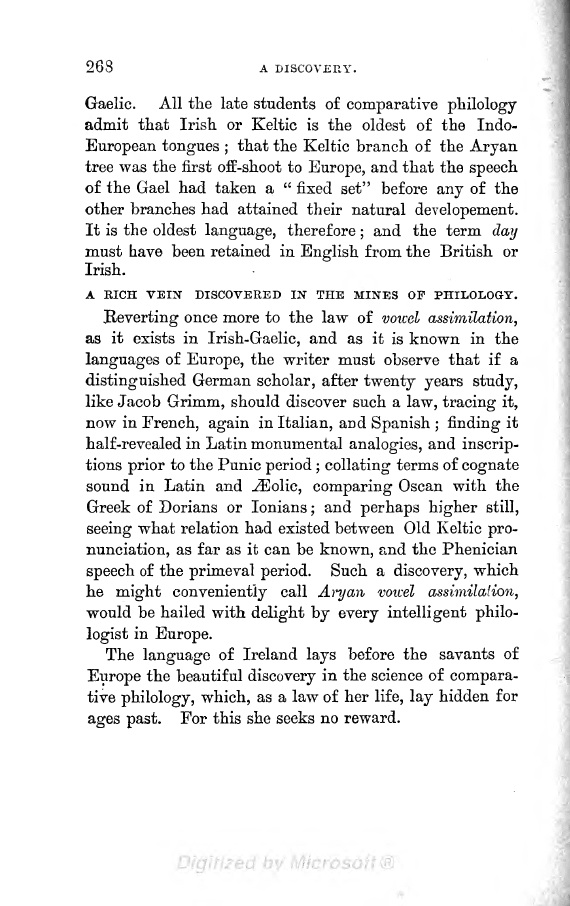
268
A
DISCOVERY.
Gaelic. All the late
students of
comparative
philology
admit
that
Irish
or
Keltic
is
the
oldest of the Indo-
European
tongues
;
that
the
Keltic branch of the
Aryan
tree was
the
first
off-shoot
to
Europe,
and
that the
speech
of the Gael had taken
a
"
fixed
set" before
any
of
the
other branches had
attained their
natural
developement.
It is
the
oldest
language,
therefore
;
and
the term
day
must
have
been
retained
in
English
from
the British or
Irish.
A RICH
VEIN DISCOVERED
IN THE
MINES OF PHILOLOGY.
Reverting
once more to
the law of
vowel
assimilation,
as
it
exists in
Irish-Gaelic,
and
as it
is known
in the
languages
of
Europe,
the
writer
must observe that
if a
distinguished
German
scholar,
after
twenty
years
study,
like
Jacob
Grimm,
should discover
such
a
law,
tracing
it,
now
in
French,
again
in
Italian,
and
Spanish
;
finding
it
half-revealed
in
Latin monumental
analogies,
and
inscrip-
tions
prior
to the Punic
period
;
collating
terms of
cognate
sound
in Latin and
.^Eolic,
comparing
Oscan
with
the
Greek of Dorians or
lonians
;
and
perhaps higher
still,
seeing
what relation had existed between Old Keltic
pro-
nunciation,
as
far as
it
can be
known,
and
the Phenician
speech
of the
primeval period.
Such
a
discovery,
which
he
might conveniently
call
Aryan
vowel
assimilation,
would
be hailed with
delight
by
every
intelligent
philo-
logist
in
Europe.
The
language
of Ireland
lays
before
the savants
of
Europe
the beautiful
discovery
in the science of
compara-
tive
philology,
which,
as
a law
of
her
life,
lay
hidden
for
ages past.
For this she seeks
no reward.
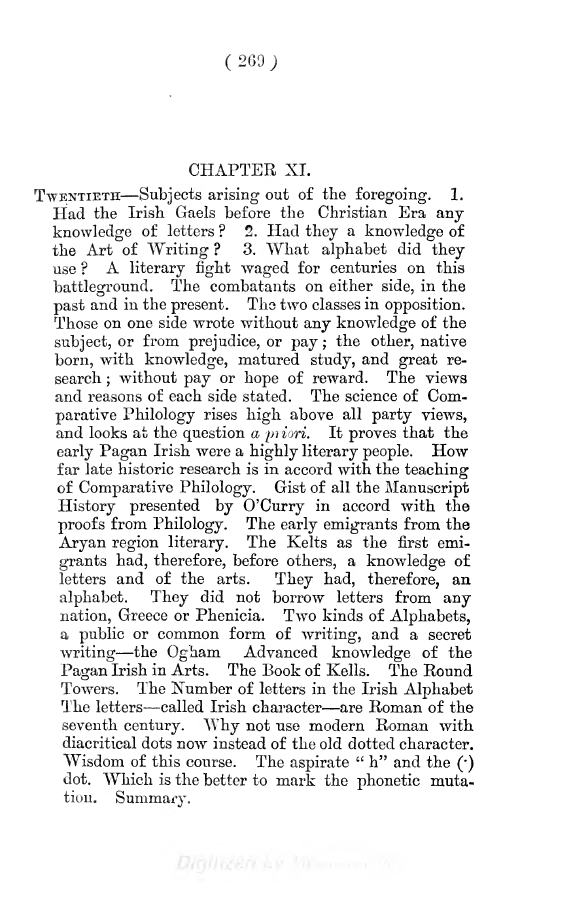
(269;
CHAPTER XT.
TWENTIETH
Subjects
arising
out of
the
foregoing.
1.
Had
the
Irish
Gaels
before
the Christian Era
any
knowledge
of letters
?
2. Had
they
a
knowledge
of
the
Art
of
"Writing?
3. What
alphabet
did
they
use
?
A
literary fight
waged
for
centuries on
this
battleground.
The
combatants
on
either
side,
in
the
past
and
in the
present.
Tho
two classes
in
opposition.
Those
on
one side wrote
without
any
knowledge
of the
subject,
or
from
prejudice,
or
pay
;
the
other,
native
born,
with
knowledge,
matured
study,
and
great
re-
search
;
without
pay
or
hope
of reward.
The views
and reasons
of each
side stated. The
science of
Com-
parative
Philology
rises
high
above
all
party
views,
and
looks
at the
question
a
priori.
It
proves
that
the
early
Pagan
Irish were
a
highly literary
people.
How
far
late historic research is
in
accord with
the
teaching
of
Comparative Philology.
Gist
of all
the
Manuscript
History
presented by
O'
Curry
in
accord
with the
proofs
from
Philology.
The
early
emigrants
from the
Aryan region literary.
The Kelts as the
first emi-
grants
had,
therefore,
before
others,
a
knowledge
of
letters
and of the arts.
They
had,
therefore,
an
alphabet.
They
did
not
borrow
letters
from
any
nation,
Greece or
Phenicia.
Two kinds
of
Alphabets,
a
public
or
common form of
writing,
and
a
secret
writing
the
Ogham
Advanced
knowledge
of the
Pagan
Irish
in
Arts. The
Book of Kells. The
Round
Towers.
The Number of
letters
in
the
Irish
Alphabet
The letters called Irish
character are Roman of the
seventh
century.
Why
not use
modern
Roman
with
diacritical
dots
now
instead of
the
old
dotted
character.
Wisdom
of
this
course.
The
aspirate
"
h"
and the
()
dot. Which is
the
better
to
mark the
phonetic
muta-
tion.
Summaiy.
